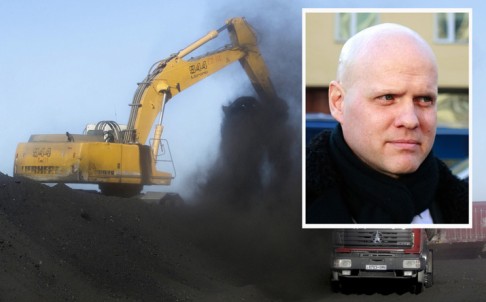Mongolian court convicts American, Filipino mining firm executives over tax evasion
PUBLISHED : Saturday, 31 January, 2015, 2:52pm
UPDATED : Saturday, 31 January, 2015, 2:52pm
Agence France-Presse in Ulan Bator

Justin Kapla (inset) was one of the SouthGobi executives found guilty of tax crimes in Mongolia. In this file photo, coal is loaded onto SouthGobi Energy trucks. Photo: Bloomberg, AFP
A Mongolian court yesterday found three former executives of a foreign-owned mining company guilty of tax evasion and sentenced them to prison terms of more than five years each, prosecutors said,
The court in the Mongolian capital of Ulan Bator delivered the guilty verdicts and prison terms to Justin Kapla, a US citizen, and Philippine nationals Hilarion Cajucom and Cristobal David, according to a statement from the Capital City’s Attorney’s Office.
Kapla and David were given sentences of five years and 10 months each, while Cajucom received five years and six months, it said.
There was no immediate word on any appeal plans.
The verdict is likely to send a chilling message to foreign investors in Mongolia, where the once high-flying economy has been badly hit by a collapse in foreign investment and in commodity prices.
Mongolia, for decades a tightly-controlled Soviet satellite, shook off communism a quarter century ago but has struggled to cash in on its rich natural bounty amid political disputes and resource nationalism.
The three were all former executives of mining company SouthGobi Sands, a Mongolia-registered but foreign-controlled business that operates the Ovoot Tolgoi coal mine, which extracts and sells the resource to customers in China.
SouthGobi Sands is 100 per cent owned by Toronto- and Hong Kong-listed SouthGobi Resources, according to the SouthGobi Resources website.
Canada’s Turquoise Hill Resources, majority owned by British-Australian multinational Rio Tinto, owns a major stake in SouthGobi Resources, the website says.
SouthGobi Sands was fined 35.3 billion tugriks (HK$141 million) “to compensate for loss from the state”, the prosecutors’ statement said.
SouthGobi Resources has denied allegations of wrongdoing.
Kapla, a former president and executive director of SouthGobi Sands, Cajucom and David had been forbidden from leaving Mongolia for more than two years amid suspicions the company had failed to pay sufficient taxes.
In November, the Office of the UN High Commissioner for Human Rights registered a claim against the Mongolian state on Kapla’s behalf.
The US embassy in Ulan Bator swiftly issued a statement after the trial, saying it was marred by communication issues.
“Several embassy officials attended the trial, including Ambassador Piper Campbell, and noted that there were interpretation problems during the trial,” the statement said.
“Because of these problems, the defendants stated during the trial that they could not understand the interpretation, nor could they express themselves clearly.”
The Great Hural, Mongolia’s parliament, voted in November to dismiss the previous prime minister after he was accused of cronyism and failing to address growing economic problems and a new government has been formed.
The landlocked country wedged between giants China and Russia enjoyed world-beating economic growth in recent years - peaking at 17.5 per cent in 2011 - on the back of a boom in resources exports, mainly of coal, copper and iron ore.
But a new foreign investment law put off investors and economic expansion slowed to 5.3 per cent in the first half of last year, while the country faces rising inflation and a falling currency.
